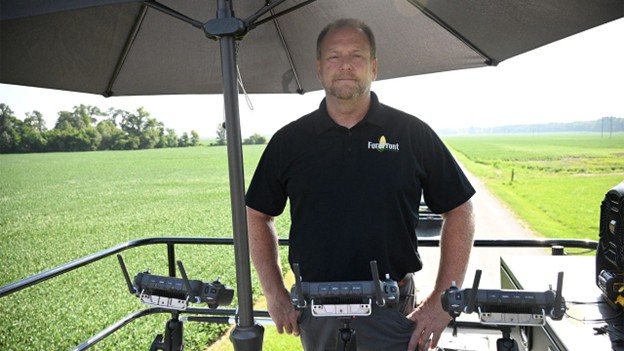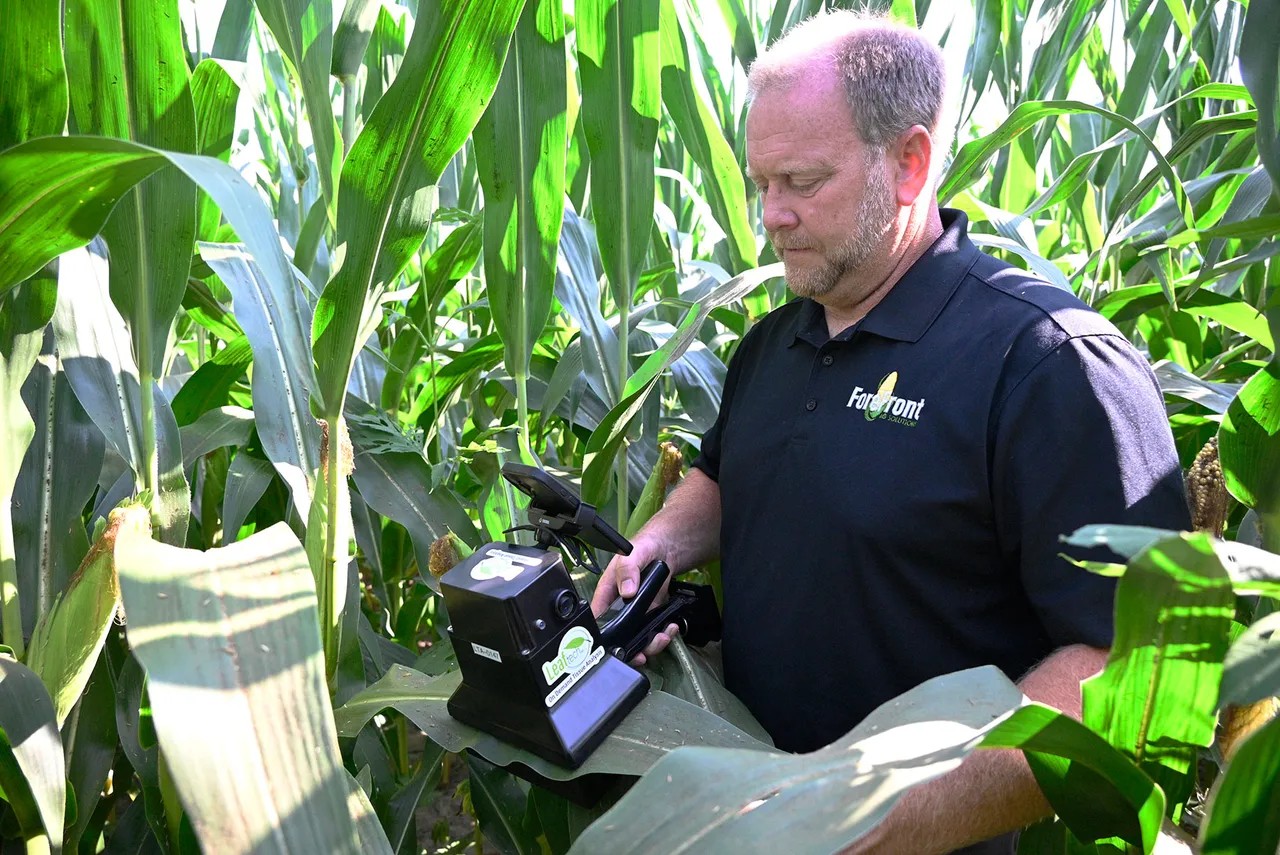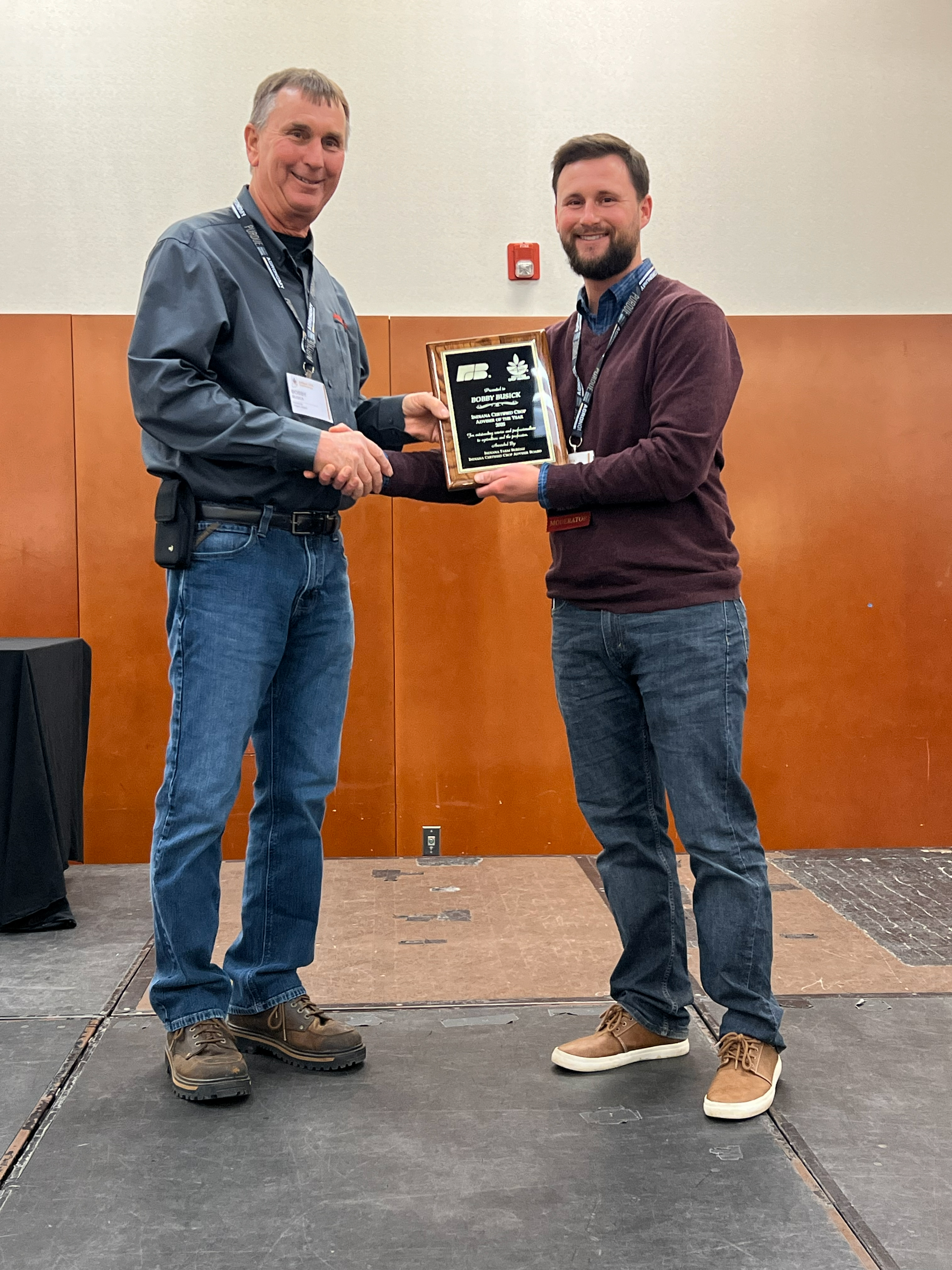Erich Eller is the 2024 Indiana CCA of the Year!
This agronomist stays ahead of tech curve
Focusing on new technology and data enables crop adviser Erich Eller to help his clients squeeze the most out of every acre.

OPEN MIND: A willingness to try new technology helps Erich Eller give his growers the tools they need to succeed — and helped him earn the title of 2024 Indiana CCA of the Year. This season, he brought spray drones into the lineup for the first time, allowing him to address grower needs like never before. Photos by Allison Lynch
Making the switch from a basic monitor to the John Deere Computer Trak 100 for his uncle’s corn planter marked a defining moment in Erich Eller’s life trajectory. It was one of those “pick-your-path” type of decisions. He remembers his uncle’s feelings on the new technology, loud and clear.
“He wanted nothing to do with that monitor,” Eller recalls. “But he knew that was the way to go. That was my first chance to get to play with new technology, and I loved it.”
Since that moment, Eller was hooked. After obtaining a bachelor’s degree in agronomy from Purdue University and gaining experience in precision agriculture and ag sales, he cultivated his own path 12 years ago with the creation of ForeFront Ag Solutions in Huntington, Ind., alongside his wife, Jennifer. Most recently, Eller was recognized as the 2024 Indiana Certified Crop Adviser of the Year.
“I did not set out doing what I do to win that award,” Eller says. “But it is a good validation that we’re on the right path.”
A different approach
What sets Eller’s business apart from other ag retailers, crop advisers and agronomists is that technology and data are the driving force. He recognizes that this approach may not appeal to all farmers.
However, for those wanting to make sense of their data, he can point them in the right direction. Using FieldAlytics software, Eller sorts through growers’ data to offer insights that will drive decisions. Whether it’s yield monitor data, soil sample results or tissue sample results — you name it, and he is eager to dive in.
“I want to understand deeper what is going on in the fields,” Eller adds. “That’s something I really want to focus on.”
For example, over the last few years, he has flown a drone to assess stand counts shortly after emergence in corn and soybeans. Using that data, he tries to make sense of what affects stand counts so he can help growers avoid those problems the next time they grow that crop.
Eller also has helped a grower understand why certain patches in their cornfield exhibited significantly lower yields — to the tune of 100 bushels or more in some spots. The farmer’s yield monitor data showed increasing yield hits in these areas over the past decade, but the farmer hadn’t noticed those trends until it became a big problem.
He consulted Eller, who started with a soil test before moving to a soil compaction test. Those provided no answers. After some further digging, he discovered the culprit was a 300% increase in corn-specific nematodes.
“The data helped me find areas that were being affected,” Eller explains. “It didn’t necessarily say what was the problem, but it showed me areas where the problem was happening.”
Staying ahead of tech
When it comes to technology adoption, Eller aims to be above early-adopter status. “I’m ahead of the early adopters, and that’s why we call our business ForeFront,” Eller says. “I want to be three to five years ahead of the industry.”
Part of achieving this goal is beta testing products before they are publicly available. Some of these products include drone cameras and leaf tissue sensors.
Collaborating with companies to put their products to the test not only gives Eller the chance to tinker with new technology and see how it could impact his growers, but also enables him to give valuable feedback to the tech companies.
“We’ve helped them understand how to implement some things in the field,” he adds. Part of that process is simply learning that some products just aren’t functional for farmers.

INSIGHTS FROM THE FIELD: One piece of technology that Erich Eller swears by is the LeafTech scanner, which provides a molecular-level look at crops right at your fingertips.
Eller’s eagerness to incorporate new technology draws on that initial decision to embrace it on his uncle’s farm. Since that time, his goal has been to find better ways to do things while increasing profitability. For that same reason, he hopes he can help growers find new technology that fits their operations.
“This is just that next evolution — maybe not of mechanical improvements, but of digital improvements,” Eller says. “How can you do things better?”
3 technologies to embrace
Rolling out any new piece of technology comes with a heavy dose of skepticism. Promises to deliver an extra 10 bushels per acre may seem far-fetched. How can you know what will be profitable on your farm?
“There’s been a lot in precision ag that has overpromised and underdelivered,” Ellersays. “They’ll say, ‘This is the next best thing, and it can put an extra 10 bushels on,’ and then it doesn’t.”
While he shares that skepticism, he is also the first to adopt new products. Staying ahead of the technology curve enables Eller to sift through what works and what doesn’t so farmers can skip straight to incorporating what makes sense. Here are three pieces of technology that he says farmers should be testing right now:
- Drones for imaging. Consider purchasing a small drone with cameras to get a bird’s-eye view of your fields. Capturing photos from the sky can give you a better look at weed pressure to better understand the best approach for control. Some cameras even identify and log weed pressure.
- Spray drones. Eller recommends contracting with an ag retailer or drone company to spray some of your acreage with drones. This technology is still new enough that he doesn’t advise purchasing your own drone just yet. However, testing the technology can allow you to weigh the pros and cons in your operation.
- LeafTech scanners. These scanners turn a simple walk through the field into an in-depth science lesson, enabling you to understand your plants at a molecular level with just a hand-held device. Given the cost, Eller advises working with your agronomist or ag retailer to see how the technology works before purchasing your own.
Combining these three technologies will give you valuable insights that can help you make smarter decisions in tight-margin years.
“Now, you combine that weed map with your leaf scan, and you can tank-mix a pretty nice package together in that spray drone to take care of things,” Eller says.




